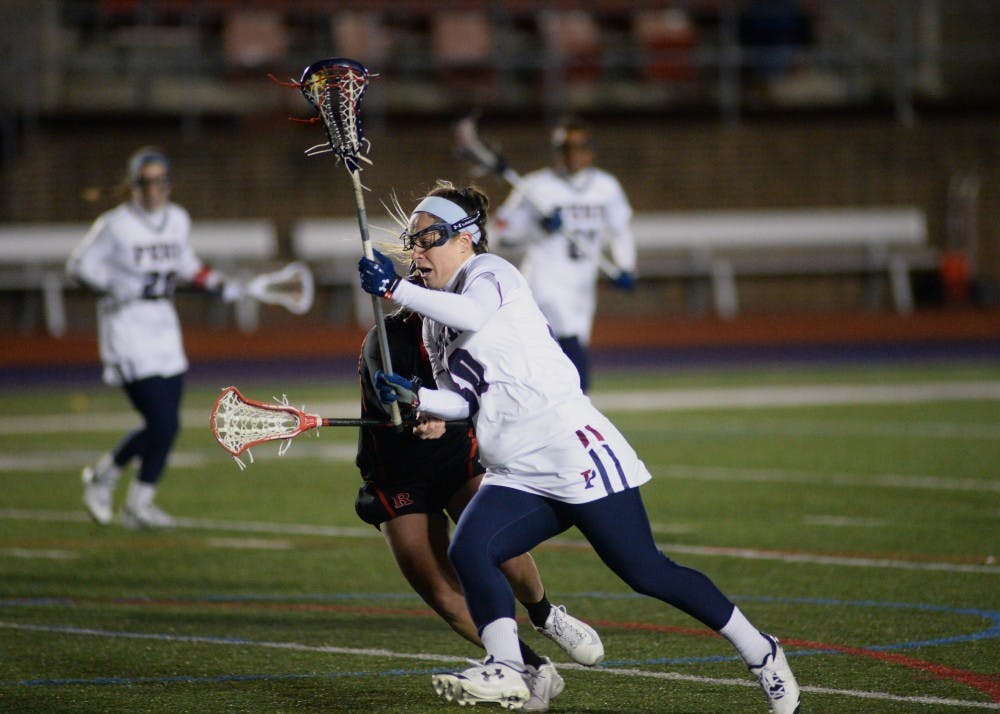
It was always going to be difficult for Penn women's lacrosse to build off the loss of Nina Corcoran, but junior midfielder Alex Condon has stepped up her game to keep the Red and Blue near the top.
Credit: Alex FisherThere are few constants in Penn Athletics over the years, but perhaps the most prominent one is the play of the women’s lacrosse team. Year after year, the program churns out some of the nation’s elite lacrosse players while maintaining good standing in the NCAA rankings.
Impressively, despite the revolving door of college sports, the Quakers have had a constant influx of stars. The newest one is junior Alex Condon, who has become a go-to player in the midfield.
As a freshman, the Virginia native saw limited in-game action but was one of the better talents on the draw. Her 12 draw controls were 12th most on the team in 2015, but tied for first among non-starters. With a talented senior class leaving the fold that season, Condon was moving up the pecking order for playing time.
Condon would see the field far more often in 2016. For the first dozen or so games, she was one of the team’s first subs and would sometimes be sent in immediately after the opening draw. This uptick in on-field action helped Condon raise her game, as she knew that every in-game opportunity carried weight in future lineup decisions.
“I definitely think not starting those games but getting in to play was a motivation because I knew my coaches saw potential in me to be on the field and I just needed to work that much harder to secure a starting spot [rather than] subbing in and out on the fly,” Condon said.
The tides began to turn when Condon strung together a run of hat tricks. In her last 12 games of 2016, the quick-shooting midfielder had nine performances with three or more goals. If that sounds like a lot, that’s because it is — Condon’s play progressed from a pretty good early season to an elite performance down the stretch. When all was said and done, her 41 goals that year were the sixth-most in program history.
However, neither Condon nor the team was able to put its best foot forward in the NCAA Tournament, as the Quakers were taken down by Penn State in the quarterfinals. In that game, Condon failed to score in her only shot on goal and had to watch her Quakers get bounced in an 8-4 loss. As Condon sees it, that result has helped her raise her play to new heights.
“They were able to stop my cuts and [left] me not knowing what else to do on the attack to contribute and help us win that game.”
Condon would go on to self-reflect and address her play in conversations with the coaches. She put in work over the summer to improve her feeding and dodging, which would in turn make her a much tougher talent to defend. Coach Karin Corbett saw these alterations from the season’s onset.
“Alex came back this year ready to not be just a cutter. It’s something she stated pretty early,” Corbett said. “She wanted to be a player who could have an impact on the field in any way to help the team win.”
After Condon’s highly impressive 2016 campaign — which included first team All-Ivy, first team all-region, and third team All-American honors — it seemed a foregone conclusion that she would be the one to drive the offense in 2017. Adding to that pressure was the loss of program great Nina Corcoran.
Breaking the school and Ivy League records for career assists, Corcoran graduated in 2016, thus ending the lethal on-field duo she formed with Condon. The two connected time after time last season, with Corcoran feeding the midfielder for several of her goals. Given the challenges that come with forming new on-field relationships, Corbett was impressed by her midfielder’s attitude and early season play.
“Alex scored a lot of goals last year and a big question for everybody was, with Nina gone, our true feeder, ‘how was Alex going to do?’” Corbett said. “Obviously she’s shown that she can get open and win 1-on-1s and create for herself.”
The team is scoring around the same as it did last year, but Condon is shooting more, scoring more, and assisting more on a per-game basis in 2017. The midfielder attributes that development to the freedom that her coaches have given her this season, among other things.
There is far more to being a strong midfielder than shooting and scoring. What makes Condon such a difficult talent to game-plan against is her ability to play the entire field. She is on pace to set highs in ground balls, caused turnovers, and close in on her personal best in draw controls — previously 12. All three of those are signs of a player who puts team play first over her own accolades.
One challenge for Condon, and midfielders in general, is the task of leading the team in-game. As Corbett recognizes, midfielders tend to be gassed over the course of play and may not have the needed energy or stamina to rally the troops. Condon, naturally a quiet player, is looking to become a more vocal leader.
“It’s really hard for a midfielder to be the general, because they’re tired. What she is doing well is in the huddle she’s talking more, she’s taking the middies under her wing and helping them adjust to the game,” Corbett said. “She’s a quiet person naturally, so it’s not that comfortable for her, but I think she’s really trying to do what we need as a team and get out of her comfort zone to not just be a leader by example but vocalize more what she sees because she has such great game sense and great vision.”
Given that she has not even finished her third season, Condon’s rise to stardom has been impressive. If she continues her current scoring pace, Condon will go down as one of the top goal-scorers in program history.
“I’ve never coached a kid with the hands she has, and, to be quite honest, how efficient she is,” Corbett said.
Whereas other midfielders will have top-end speed or stamina, Condon’s calling is her efficiency. Her ability to work in tight spaces and create plays out of nothing are second to none.
This is not to say that this year’s team is strictly the Condon show. Several players — including Emily Rogers-Healion, Caroline Cummings, Britt Brown, Maddy Rosenzweig and Erin Barry — are having career years and have made the transition from the Corcoran era less troublesome than expected. Condon having a career year helps matters, but the junior midfielder is not singlehandedly carrying the load.
“We can’t be a one-person show and in the last couple games we’ve shown we have a lot of kids who can put points on the board,” Corbett said. “[Alex] doesn’t want to be that superstar, but she feels a lot of weight on her shoulders when she doesn’t score.”
As the season continues, the Quakers will look for contributions from their entire lineup. If that happens, Condon can stick to being a ballhawk that can control the midfield, and the team can ultimately try to improve on last year’s early exit from the NCAA Tournament.
The Daily Pennsylvanian is an independent, student-run newspaper. Please consider making a donation to support the coverage that shapes the University. Your generosity ensures a future of strong journalism at Penn.
Donate






